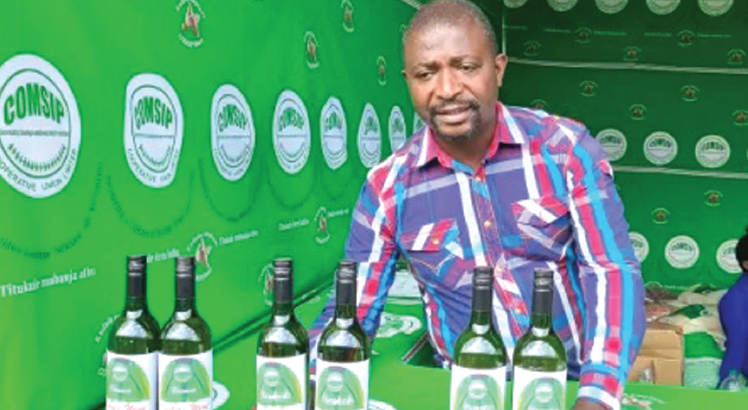Group goes bananas amid climate shocks
As global warming shrinks crop yields, Al Jazeera Correspondent COLLETA DEWA details the frustration faced by banana wine producers of Karonga.
Regina Mkandawire, 38, has grown bananas on her small farm in Karonga District for more than 16 years. But heat waves, floods and disease outbreaks have gradually reduced her yields from half a tonne to a few buckets per harvest since 2010.
“If it’s extremely hot, ripe bananas will quickly rot, meaning you won’t be able to sell them,” the mother of six told Al Jazeera. “When floods happen, the trees are affected and heavy storms can destroy a whole farm.”
Malawi is suffering some of the worst impacts of climate change despite being one of the world’s lowest emitters of greenhouse gases.
The dry spell caused by the El Nino weather pattern in the 2016/17 rainy season left a third of the country’s population in dire need of food aid.
Two years later, Cyclone Idai pushed two million people into extreme poverty.

According to the Food and Agriculture Organisation of the United Nations, Malawi loses up to 33 tonnes of soil per hectare every year.
Extreme weather affects the production of banana, the country’s fourth biggest staple crop after maize, rice and cassava.
With temperatures sometimes reaching 43 degrees Celsius, bananas wilt and hardly give optimal harvests.
Banana wine
Frustrated by repeated losses, some four men and 30 women from Mlare in Karonga started making wine using overripe bananas bought from other farmers.
Twitule Cooperative began in 2012 with founding members like Mkandawire. However, after training by the Community Savings and Investment Promotion (Comsip) Cooperative Union, its mission has evolved.
“The project is a source of livelihood for this community and testifies to how communities in Malawi are fighting the effects of climate change,” says Comsip spokesperson Mercy Kayuni.
The group sells its sweet-tasting alcoholic beverage in other districts and neighbouring countries such as Zambia and Tanzania.
Their winery plant comprises a small room with neither electricity nor running water. The cooperative members use plastic buckets as mixing and storage jugs.
Twitule winery chairperson Vyanitonda Kasimba says the group produces at least 50 bottles a day and each sells at K3 000.
“The cooperative doesn’t have a bottling facility, so Comsip Union purchases wine in bulk from them and facilitates improved bottling that is appealing and helps them with marketing that attracts high prices,” she said.
Mkandawire, whose husband is unemployed, has become her family’s breadwinner through proceeds from the wine business.
“Being a member of Twitule wine production helped me construct better houses at home. I also send my children to school with proceeds from the project,” she said.
Her group mate Evelyn Mwabungulu raises goats using proceeds from the wine project. She started with one goat but now has 14.
“When I sell them, I meet the needs of my family, especially taking my children to better schools. I am now looking forward to upgrade into cattle farming,” she said.
Surmounting challenges
The production of banana wine has not been without its challenges.
Most customers prefer their wine cold, but lack of electricity made the group’s refrigerator useless. So, the group found a makeshift solution: digging a five-metre-deep pit instead.
“We use a thermometer to measure the temperature inside the pit before placing in the wine,” Mkandawire explained.
Documents seen by Al Jazeera show that the cooperative paid Electricity Supply Corporation of Malawi (Escom) in May 2021, but the community has yet to be connected to the national grid.
Escom spokesperson Kitty Chingota said climate change had contributed to the delay.
She explained: “The devastating effects of cyclones and other destructive weather patterns usually uproot and vandalize electricity infrastructure.
“This means the utility will have to spend more resources on repairs at the expense of other projects.”
Chingota also blamed rising inflation as the utility imports most of its equipment, but the kwacha-dollar exchange rate keeps rising.
Al Jazeera saw pipes installed by the water board from the main reservoir to the area, but the cooperative still does not have water.
Twitule wine has passed pre-certification tests by the Malawi Bureau of Standards, so it is considered suitable for consumption. However, the regulator has yet to approve commercial-scale sales.
“There have been endless suggestions from the bureau to the cooperative on what they should do to be certified and most of these have been followed. Currently, the cooperative is awaiting another visit from the bureau to see if certification will be granted,” Kayuni said.
For now, the group showcases the wine at national trade fairs and sells informally through Comsip to retail shops and hotels while waiting for the certification to boost revenues.
Malawi Bureau of Standards spokesperson Monica Khombe told Al Jazeera she had no time to compile information about the delayed approval.
‘We will keep pushing’
Since delving into wine production, Twitule has acquired a farm specifically for banana farming, but heavy rains destroyed its crop.
Still, its members are determined to try again.
“We will keep pushing until we transform this whole community through banana wine production. We want to produce wine that can be consumed as far as Europe and America,” Mkandawire said.—Al Jazeer





